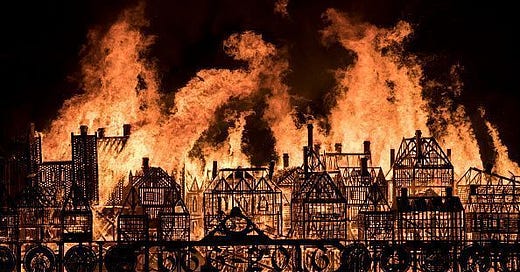How the Changing of Times and Habits Personally Affect Us
The Great Fire of London
If you are young, you may think that the populace controls weather conditions. And where did you learn this stupid concept that you are utterly in control?
The truth is that you will grow old. Then, you may have gained some wisdom and realized you spent a lifetime muddling around, not changing weather patterns or anything else. This comment is not meant as an insult but rather to enlighten you more about growing older and wiser.
We are part-time residents on the earth. And, as you age, you will see yourself as more of a navigator than anything else.
Too, nothing remains constant-tornadoes; floods, fires, arson, riots, etc., can swoop in and take down homes, cities, public buildings, etc.
And that changes occur over time. One can drive down any street in America and note specific changes since the last visit. It is the way of things. Therefore, we must expect it. Some rather dramatic changes have occurred in recent years. In fact, since the emergence of technology in the 1900s, all Americans' lifestyles have improved. Yesterday, we learned how to use the tractor. Today, we know how to use the Internet and more. Our future is bright.
But why are books and literature disappearing from library shelves? Has the iPhone replaced our source of knowledge with technical mechanisms? Or, more pointedly, will the Internet snuff out these collections?
Andrew Carnegie, the steel magnate and founder of public libraries
Captain of industry and benefactor, born of a poor family in Scotland, came to America with his father.
Andrew Carnegie was a man of the industrial age. He was born in Fife, Scotland, and removed to America, where he built an empire. Does it matter that he became wealthy? His heirs inherited his fortune and were forgotten like the other millionaires of his time and forgotten and replaced.
People do not remember Candler's legacy to America, which is the construction of libraries. In former times, many families kept a library inside their homes. Books were a source of knowledge and improvement and were greatly valued. Candler, like his peers, was an avid reader.
Even today, there remains a curiosity concerning the secrets of acquiring wealth. The search goes on but in a different way. One googles their question, and youtube provides the answer, Wikipedia, or the author of an article. But how did that data become factual? Was it made accurate because it was discovered on the Internet? I will answer this for you. If a "source" is provided, you are on the road to discovering the truth. But then, shouldn't we check out the source for ourselves? After all, a proper interpretation of what we read is essential.
The answer for genealogists is a double "yes!"
Another source of discovery today is the news media. During World War II, I recall visiting the local theatre every Saturday. That was when news of the war flashed on the screen, and facts were delivered concerning the battles, etc. In those days, a reporter was a person who reported the facts as they saw them.
But then something happened. The war ended, and America grew more prosperous and heavy with televised reporters and politicians.
The invention of the Internet was a remarkable discovery. It connected families and people through social programs. Yet, as we learned more about algorithms and data selling, it only became a micronism of former newspapers and television news programs.
And the fight for change is on!
Large companies such as Google and Facebook expanded worldwide as individuals battled for freedom. The wealth today is dominated by a few rich men! And where are we now in this mess?
From a researcher's point of view, we are losing vital information via the distortion of history in most public media. Also, the public arena has made some critical changes, as follows:
Security officers dominate courthouses and no longer offer easy access to records and documents.
Old records, once stored in a "Record Room," have been removed to off-site cold storage. These old wills, estates, marriages, etc., that once suffered from dampness are again in cold storage and unavailable to visitors. An example of this in Georgia is Chatham County which houses the oldest records in the State! You can order the documents from storage, but there is a 3-day wait.
Historical Societies have taken possession of certain county records. This is something to remember when personally visiting an area.
Current newspapers used to be a read "item" in local libraries. One no longer notices a stack of old and new newspapers.
Social demands and riots have caused certain books to be removed from library shelves, particularly books concerning the Civil War.
Social demands incite rioters to remove historical Monuments.
Ignorance of history is plaguing America.
So, what is the answer to preservation? Will the Internet feature every bit of data ever written? And how will this Internet survive the times? Artificial Intelligence is an exciting prospect, but is a program designed to make work easier or chocked with surreal data? And will common core math be implemented? I would question the process.
In conclusion, we do not personally control the weather, irrespective of our preservation method. In September 1666, the Great Fire of London destroyed most civic buildings, old St. Paul's Cathedral, 87 parish churches, and about 13,000 houses. That wiped out most of all the ancient records dating back to William the Conqueror and possibly earlier. The remainder consists of preserved monuments of royalty.
All summer, a haze of Canadian wildfires lingers over Atlanta. We do not control the weather. Yet we can prevent further damage by cleaning up our forests.
Many researchers preserve their genealogy. My effort to keep 60 years of research is currently held on
This is where it will remain until a better resource emerges!



